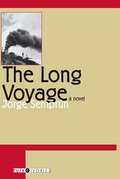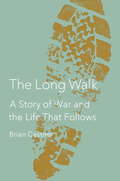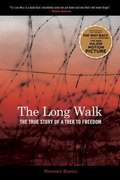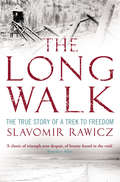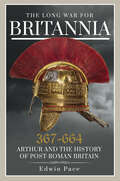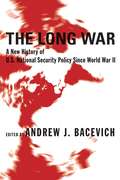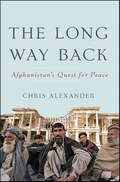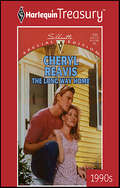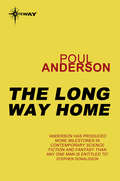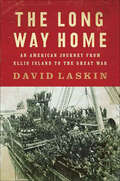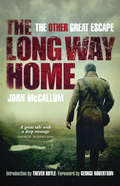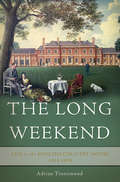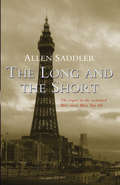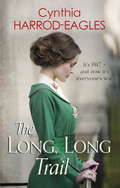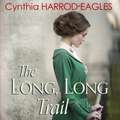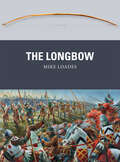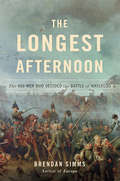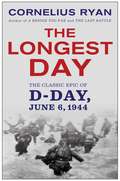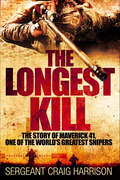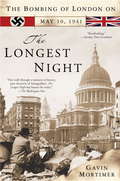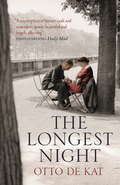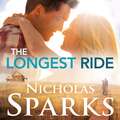- Table View
- List View
The Long Voyage
by Jorge Semprun Richard SeaverThe Long Voyage is Jorge Semprun's devastatingly honest and heart-breaking account of a young Spaniard captured fighting with the French Resistance, and the days and nights he spends in the company of 119 other men in a cattle truck that rolls slowly but inexorably towards Buchenwald. During the seemingly endless journey, he has conversations that range from his childhood to speculations about the death camps. When, at last the fantastic, Wagnerian gates to Buchenwald come into sight, the young Spaniard is left alone to face the camp. First published in 1963 in French, The Long Voyage won the prestigious Formentor Prize and is considered one of the classics of Holocaust literature.
The Long Walk: A Story of War and the Life That Follows
by Brian CastnerIn the tradition of Michael Herr's Dispatches and works by such masters of the memoir as Mary Karr and Tobias Wolff, a powerful account of war and homecoming.Brian Castner served three tours of duty in the Middle East, two of them as the commander of an Explosive Ordnance Disposal unit in Iraq. Days and nights he and his team--his brothers--would venture forth in heavily armed convoys from their Forward Operating Base to engage in the nerve-racking yet strangely exhilarating work of either disarming the deadly improvised explosive devices that had been discovered, or picking up the pieces when the alert came too late. They relied on an army of remote-controlled cameras and robots, but if that technology failed, a technician would have to don the eighty-pound Kevlar suit, take the Long Walk up to the bomb, and disarm it by hand. This lethal game of cat and mouse was, and continues to be, the real war within America's wars in Iraq and Afghanistan. But The Long Walk is not just about battle itself. It is also an unflinching portrayal of the toll war exacts on the men and women who are fighting it. When Castner returned home to his wife and family, he began a struggle with a no less insidious foe, an unshakable feeling of fear and confusion and survivor's guilt that he terms The Crazy. His thrilling, heartbreaking, stunningly honest book immerses the reader in two harrowing and simultaneous realities: the terror and excitement and camaraderie of combat, and the lonely battle against the enemy within--the haunting memories that will not fade, the survival instincts that will not switch off. After enduring what he has endured, can there ever again be such a thing as "normal"? The Long Walk will hook you from the very first sentence, and it will stay with you long after its final gripping page has been turned.From the Hardcover edition.
The Long Walk: The True Story of a Trek to Freedom
by Slavomir Rawicz"I hope "The Long Walk" will remain as a memorial to all those who live and die for freedom, and for all those who for many reasons could not speak for themselves." --Slavomir Rawicz In 1941, the author and six other fellow prisoners escaped a Soviet labor camp in Yakutsk--a camp where enduring hunger, cold, untended wounds, untreated illnesses, and avoiding daily executions were everyday feats. Their march--over thousands of miles by foot--out of Siberia, through China, the Gobi Desert, Tibet, and over the Himalayas to British India is a remarkable statement about man's desire to be free.
The Long Walk: The True Story of a Trek to Freedom
by Slavomir Rawicz'I hope The Long Walk will remain as a memorial to all those who live and die for freedom, and for all those who for many reasons could not speak for themselves'Slavomir RawiczSlavomir Rawicz was a young Polish cavalry officer. On 19 November 1939 he was arrested by the Russians and after brutal interrogation he was sentenced to twenty-five years in a gulag.After a three-month journey in the dead of winter to Siberia, life in a Soviet labour camp meant enduring hunger, extreme cold, untreated wounds and illnesses and facing the daily risk of arbitrary execution. Realising that to remain meant almost certain death, Rawicz, along with six companions, escaped. In June 1941, they crossed the trans-Siberian railway and headed south, climbing into Tibet and freedom in British India nine months later, in March 1942, having travelled over four thousand miles on foot through some of the harshest regions in the world, including the Gobi Desert, Tibet and the Himalayas.First published in 1956, this is one of the greatest true stories of escape, adventure and survival against all odds. In 2010, a film, The Way Back, based on the book, directed by six-time Academy Award-nominee Peter Weir (Master and Commander, The Truman Show, and The Dead Poets Society) was released. It starred Colin Farrell, Jim Sturgess and Ed Harris.
The Long War for Britannia 367–664: Arthur and the History of Post-Roman Britain
by Edwin PaceThe Long War for Britannia is unique. It recounts some two centuries of ‘lost’ British history, while providing decisive proof that the early records for this period are the very opposite of ‘fake news’. The book shows that the discrepancies in dates claimed by many scholars are illusory. Every early source originally recorded the same events in the same year. It is only the transition to Anno Domini dating centuries afterward that distorts our perceptions. Of equal significance, the book demonstrates that King Arthur and Uther Pendragon are the very opposite of medieval fantasy. Current scholarly doubts arose from the fact that different British regions had very different memories of post-Roman British rulers. Some remembered Arthur as the ‘Proud Tyrant’, a monarch who plunged the island into civil war. Others recalled him as the British general who saved Britain when all seemed lost. The deeds of Uther Pendragon replicate the victories of the dread Mercian king Penda. These authentic--yet radically different--narratives distort history to this very day.
The Long War: A New History of U.S. National Security Policy Since World War II
by Andrew BacevichEssays by a diverse and distinguished group of historians, political scientists, and sociologists examine the alarms, emergencies, controversies, and confusions that have characterized America's Cold War, the post-Cold War interval of the 1990s, and today's "Global War on Terror." This "Long War" has left its imprint on virtually every aspect of American life; by considering it as a whole, The Long War is the first volume to take a truly comprehensive look at America's response to the national-security crisis touched off by the events of World War II.Contributors consider topics ranging from grand strategy and strategic bombing to ideology and economics and assess the changing American way of war and Hollywood's surprisingly consistent depiction of Americans at war. They evaluate the evolution of the national-security apparatus and the role of dissenters who viewed the myriad activities of that apparatus with dismay. They take a fresh look at the Long War's civic implications and its impact on civil-military relations. More than a military history, The Long War examines the ideas, policies, and institutions that have developed since the United States claimed the role of global superpower. This protracted crisis has become a seemingly permanent, if not defining aspect of contemporary American life. In breaking down the old and artificial boundaries that have traditionally divided the postwar period into neat historical units, this volume provides a better understanding of the evolution of the United States and U.S. policy since World War II and offers a fresh perspective on our current national security predicament.
The Long Way Back: Afghanistan's Quest for Peace (Wayfarers Ser.)
by Chris AlexanderChristopher Alexander, Canadian’s former ambassador to Afghanistan, offers an inside look at Afghanistan recent history, and delivers a blueprint for transforming the troubled country into a viable nation. Alexander draws on expertise gained over five years on the ground in Afghanistan, chronicling the country’s initial successes following the Afghan War, the setbacks it incurred thanks to a resurgent Taliban, and the tenuous stability that multilateral diplomacy has brought the war-torn yet rebuilding nation. Readers of Ahmed Rashid’s Descent into Chaos and Alex Berenson’s Lost in Kandahar will find no more penetrating insight into Afghanistan’s past, present, and future than Christopher Alexander’s probing, expert dissection of a nation at war with itself: The Long Way Back.
The Long Way Home
by Alan Ebert Janice RotchsteinJohn Ollson, Congressional Candidate is assassinated and the actress turned activist Ms. Tiernan is injured during a campaign rally. A Vietnam veteran Brandon is arrested in this connection to investigate for the crime.
The Long Way Home
by Cheryl ReavisTHE LAST THING RITA NEEDED WAS TROUBLE....Spitfire Rita Warren had made some big mistakes before leaving her hometown and heading for the bright lights of the big city. Now she was back, to make things right. To prove that she was as good as everyone else in town. Good enough to love. Good enough to deserve the best...LIEUTENANT "MAC" McGRAW HAD TROUBLE WRITTEN ALL OVER HIM!Though the sexy officer was ornerier than a bee-stung bear, Rita could see right through the bluster to the man underneath-a soldier tormented by memories. But McGraw was too good a man to bury himself with guilt. Too good a man to deny himself a family. And Rita was the woman to prove to him the best was yet to come....
The Long Way Home
by Poul AndersonYou can't go home again. For home is not merely a place, but a situation and when that situation changes, home is no more. Captain Edward Langely of the experimental starship Explorer was to learn this the hard way...
The Long Way Home: An American Journey from Ellis Island to the Great War
by David Laskin“Moving, revealing, and lovingly researched, this book is a must read, and a great read, for any of us whose forebears came from overseas—meaning just about all of us.” — Erik LarsonThe author of the award-winning The Children’s Blizzard, David Laskin, returns with a remarkable true story of the immigrants who risked their lives fighting for America during the Great War.In The Long Way Home, award-winning writer David Laskin traces the lives of a dozen men who left their childhood homes in Europe, journeyed through Ellis Island, and started over in a strange land—only to cross the Atlantic again in uniform when their adopted country entered the Great War.Though they had known little of America outside of tight-knit ghettos and backbreaking labor, these foreign-born conscripts were rapidly transformed into soldiers, American soldiers, in the ordeal of war. Two of the men in this book won the Medal of Honor. Three died in combat. Those who survived were profoundly altered–and their heroic service reshaped their families and ultimately the nation itself.Epic, inspiring, and masterfully written, this book is an unforgettable true story of the Great War, the world it remade, and the humble, loyal men who became Americans by fighting for America.
The Long Way Home: The Other Great Escape
by John McCallumThe first-hand account of three Scotsmen and their dramatic escape from Nazi Germany&’s Stalag VIIIB prison camp during World War II. At the age of nineteen, Glasgow-born John McCallum signed up as a Supplementary Reservist in the Signal Corps. A little over a year later, he was in France, working frantically to set up communication lines as Europe once more hurtled towards war. Wounded and captured at Boulogne, he was sent to the notorious Stalag VIIIB prison camp, together with his brother, Jimmy, and friend Joe Harkin. Ingenious and resourceful, the three men set about planning their escape. With the help of Traudl, a local girl whom John had met while working in nearby Bad Karlsbrunn, they put their plan into action. In an astonishing coincidence, they passed through the town of Sagan, around which the seventy-six airmen of the Great Escape were being pursued and caught. However, unlike most of these other escapees, John, Jimmy and Joe eventually made it to freedom. Now, due to the declassification of documents under the Official Secrets Act, John McCallum is finally able to tell the thrilling story of his adventure, in which he recaptures all the danger, audacity and romance of one of the most daring escapes of the Second World War.&“A dashed good read. Especially as his escape was successful.&” —The Herald&“I couldn&’t stop turning the pages . . . a great tale—with a deep message.&” —George Robertson
The Long Weekend: Life in the English Country House, 1918-1939
by Adrian TinniswoodFrom an acclaimed social and architectural historian, the tumultuous, scandalous, glitzy, and glamourous history of English country houses and high society during the interwar period
The Long and Short
by Allen SaddlerThe Long and the Short is the second in Allen Saddler's Forties trilogy and the sequel to his acclaimed Bless Em All. Four years on from Blitz London, as news of the Normandy landings filters through the country, Allen Saddler presents new characters struggling in wartime England alongside memorable figures from the first book. Where Saddler had lives criss-crossing each other in London's streets before, this time they span north and south and with his customary narrative drive and sparkling dialogue, he describes the subtle differences, as well as similarities, between friends and enemies who are meant to be fighting a common enemy abroad.Jimmy, the delivery boy from Bless Em All has become a nervy young soldier and is reunited with the enigmatic Rosa Tcherny, the Jewish nurse who finds herself tending German POWs; Harry 'Boy' Fortune is an officer/spiv hot on the trail of two tarts, revealing his softer side along the way; Major Le Surf is his boss, carving out a sweet life for himself in a northern backwater, only to be thrust into the riddle of a murdered German POW. All of these dramas and more converge as the country moves towards V.E. Day and a final release from endless sacrifice and strain.
The Long, Long Trail: War at Home, 1917
by Cynthia Harrod-EaglesIn 1917 the Great War rages on, and for the Hunters, their friends and their servants the war is where they live now.David has returned from the Front a shadow of his former self; his sister Diana, newly married, copes with pregnancy alone, her husband at the Front. Aunt Laura, eager for challenge, goes to France with an ambulance; while Beattie struggles to manage war work and household, while racked with her secret guilt and a new threat of exposure.U-boat attacks face Britain with starvation, and with the worsening privation comes a new horror as Germany begins a lethal bombing campaign. But even in the darkest hours of war, new life and new hope can burgeon, with the promise that the future might still hold happiness for them all.The Long, Long Trail is the fourth book in the War at Home series by Cynthia Harrod-Eagles, author of the much-loved Morland Dynasty novels. Set against the real events of 1917, at home and on the front, this is a vivid and rich family drama featuring the Hunter family and their servants.
The Long, Long Trail: War at Home, 1917 (War at Home #4)
by Cynthia Harrod-EaglesIn 1917 the Great War rages on, and for the Hunters, their friends and their servants the war is where they live now.David has returned from the Front a shadow of his former self; his sister Diana, newly married, copes with pregnancy alone, her husband at the Front. Aunt Laura, eager for challenge, goes to France with an ambulance; while Beattie struggles to manage war work and household, while racked with her secret guilt and a new threat of exposure.U-boat attacks face Britain with starvation, and with the worsening privation comes a new horror as Germany begins a lethal bombing campaign. But even in the darkest hours of war, new life and new hope can burgeon, with the promise that the future might still hold happiness for them all.The Long, Long Trail is the fourth book in the War at Home series by Cynthia Harrod-Eagles, author of the much-loved Morland Dynasty novels. Set against the real events of 1917, at home and on the front, this is a vivid and rich family drama featuring the Hunter family and their servants.
The Long, Long Trail: War at Home, 1917 (War at Home #4)
by Cynthia Harrod-EaglesIn 1917 the Great War rages on, and for the Hunters, their friends and their servants the war is where they live now.David has returned from the Front a shadow of his former self; his sister Diana, newly married, copes with pregnancy alone, her husband at the Front. Aunt Laura, eager for challenge, goes to France with an ambulance; while Beattie struggles to manage war work and household, while racked with her secret guilt and a new threat of exposure.U-boat attacks face Britain with starvation, and with the worsening privation comes a new horror as Germany begins a lethal bombing campaign. But even in the darkest hours of war, new life and new hope can burgeon, with the promise that the future might still hold happiness for them all.The Long, Long Trail is the fourth book in the War at Home series by Cynthia Harrod-Eagles, author of the much-loved Morland Dynasty novels. Set against the real events of 1917, at home and on the front, this is a vivid and rich family drama featuring the Hunter family and their servants.
The Longbow
by Peter Dennis Mike LoadesBoasting a rate of shooting not seen again in English hands until the late 19th century, the longbow was the weapon at the heart of the English military ascendancy in the century after 1340. Capable of subjecting the enemy to a hail of deadly projectiles, the longbow in the hands of massed archers made possible the extraordinary victories enjoyed by English forces over superior numbers at Crécy and Poitiers, and remained an important battlefield weapon throughout the Wars of the Roses and beyond; it also played a leading role in raiding, siege and naval warfare. Its influence and use spread to the armies of Burgundy, Scotland and other powers, and its reputation as a cost-effective and easily produced weapon led to calls for its widespread adoption in the nascent armies of the American Republic as late as the 1770s. Wielded by Englishmen, Welshmen and others, the longbow fulfilled the requirements of all infantry missile weapons throughout history - it was a well-made weapon suitable for production in quantity that projected a man-stopping missile over a suitable distance at a sustainable, relatively rapid rate of shooting. The longbow was a ''self-bow'' - that is to say, it was made from one piece of wood, normally yew, with the ''belly'' of the bow being ''heartwood'' and a thinner layer of ''sapwood'' being the ''back'' of the bow. Its arrows were normally made of aspen, a light and strong wood - although ash and other woods were also used - with a variety of metal heads available, depending on the intended use. A sophisticated piece of ammunition requiring many resources and skill to manufacture, the longbow arrow could penetrate plate armour if the conditions were right; this study argues, however, that the ''blunt trauma'' inflicted on the target, however well armoured, resulted in debilitating injuries and was far more significant on the field of battle. Featuring specially commissioned full-colour artwork and informed by the latest research into this intriguing weapon, this lively study debunks lingering myths and casts new light on the battle-winning longbow, the lethal missile weapon that enabled English victories against the odds in a series of famous battles of the 14th and 15th centuries.
The Longest Afternoon: The 400 Men Who Decided the Battle of Waterloo
by Brendan SimmsIn 1815, the deposed emperor Napoleon returned to France and threatened the already devastated and exhausted continent with yet another war. <P><P>Near the small Belgian municipality of Waterloo, two large, hastily mobilized armies faced each other to decide the future of Europe--Napoleon's forces on one side, and the Duke of Wellington on the other. With so much at stake, neither commander could have predicted that the battle would be decided by the Second Light Battalion, King's German Legion, which was given the deceptively simple task of defending the Haye Sainte farmhouse, a crucial crossroads on the way to Brussels. In The Longest Afternoon, Brendan Simms recounts how these 400-odd riflemen beat back wave after wave of French infantry until finally forced to withdraw, but only after holding up Napoleon for so long that he lost the overall contest. Their actions alone decided the most influential battle in European history. Drawing on previously untapped eye-witness reports for accurate and vivid details of the course of the battle, Simms captures the grand choreography and pervasive chaos of Waterloo: the advances and retreats, the death and the maiming, the heroism and the cowardice. He describes the gallant fighting spirit of the French infantrymen, who clambered over the bodies of their fallen comrades as they assaulted the heavily fortified farmhouse--and whose bravery was only surpassed by that of their opponents in the Second Light Battalion. Motivated by opposition to Napoleonic tyranny, dynastic loyalty to the King of England, German patriotism, regimental camaraderie, personal bonds of friendship, and professional ethos, the battalion suffered terrible casualties and fought tirelessly for many long hours, but refused to capitulate or retreat until the evening, by which time the Prussians had arrived on the battlefield in large numbers. In reorienting Waterloo around the Haye Sainte farmhouse, Simms gives us a riveting new account of the famous battle--an account that reveals, among other things, that Napoleon came much closer than is commonly thought to winning it. A heroic tale of 400 soldiers who changed the course of history, The Longest Afternoon will become an instant classic of military history.
The Longest Day: The Classic Epic of D-Day
by Cornelius RyanThis is the classic story of the invasion of Normandy, and a book that endures as a masterpiece of living history. A compelling tale of courage and heroism, glow and tragedy, The Longest Day painstakingly recreates the fateful hours that preceded and followed the massive invasion of Normandy to retell the story of an epic battle that would turn the tide against world fascism and free Europe from the grip of Nazi Germany.
The Longest Kill: The Story of Maverick 41, One of the World's Greatest Snipers
by Craig HarrisonPowerful and compelling, Craig Harrison's The Longest Kill is a must-read for fans of military memoirs.It takes a tough mindset to be a successful sniper, to be able to dig in for days on your own as you wait for your target, to stay calm on a battlefield when you yourself have become the target the enemy most want to take out. Craig Harrison has what it takes and in November 2009 in Afghanistan, under intense pressure, he saved the lives of his comrades with the longest confirmed sniper kill - 2,475 meters.In this unflinching autobiography, Craig catapults us into the heat of the action as he describes his active service in the Balkans, Iraq and Afghanistan, and gives heart-stopping accounts of his sniper ops as he fought for his life on the rooftops of Basra and the barren hills of Helmand province. Craig was blown up by an IED in Afghanistan and left battling severe PTSD. After his identity was revealed in the press he also had to cope with al Qaeda threats against him and his family. For Craig, the price of heroism has been devastatingly high.
The Longest Night
by Gavin MortimerThe Longest Night reveals the untold story of the horrific bombing raid that almost brought Britain to military collapse - using extensive survivors' testimony and previously classified documents to reveal just how close the Luftwaffe came to total victory. This vivid, dramatically told account depicts how fate shifted based on Hitler's mistaken belief that he'd actually lost the air war over Britain - and portrays the unsurpassed, "we-can-take-it" bravery of the British people when they'd been pushed beyond all human endurance.
The Longest Night
by Otto de KatA masterpiece of literary craft and concision; sparse, beautiful and hugely affecting - Daily MailSince the liberation of the Netherlands, Emma Verweij has been living in Rotterdam, in a street which became a stronghold of friendships for its inhabitants during the Second World War. She marries Bruno, they have two sons, and she determines to block out the years she spent in Nazi Berlin during the war, with her first husband Carl. But now, ninety-six years old and on the eve of her death, long- forgotten memories crowd again into her consciousness, flashbacks of happier years, and the tragedy of the war, of Carl, of her father, and of the friends she has lost. In The Longest Night, his impressive, reflective new novel after News from Berlin, Otto de Kat deftly distils momentous events of 20th-century history into the lives of his characters. In Emma, the past and the present coincide in limpid fragments of rare, melancholy beauty.Translated from the Dutch by Laura Watkinson
The Longest Night
by Otto de KatA masterpiece of literary craft and concision; sparse, beautiful and hugely affecting - Daily MailSince the liberation of the Netherlands, Emma Verweij has been living in Rotterdam, in a street which became a stronghold of friendships for its inhabitants during the Second World War. She marries Bruno, they have two sons, and she determines to block out the years she spent in Nazi Berlin during the war, with her first husband Carl. But now, ninety-six years old and on the eve of her death, long- forgotten memories crowd again into her consciousness, flashbacks of happier years, and the tragedy of the war, of Carl, of her father, and of the friends she has lost. In The Longest Night, his impressive, reflective new novel after News from Berlin, Otto de Kat deftly distils momentous events of 20th-century history into the lives of his characters. In Emma, the past and the present coincide in limpid fragments of rare, melancholy beauty.Translated from the Dutch by Laura Watkinson
The Longest Ride
by Nicholas SparksNinety-one year old Ira Levinson is in trouble. Struggling to stay conscious after a car crash, with his mind fading, an image of his beloved, and long-dead, wife Ruth appears. Urging him to hang on, she lovingly recounts the joys and sorrows of their life together - how they met, the dark days of WWII, and its unrelenting effect on their families.A few miles away, college student Sophia Danko's life is about to change. Recovering from a break-up, she meets the young, rugged Luke and is thrown into a world far removed from her privileged school life. Sophia sees a new and tantalising future for herself, but Luke has a secret which threatens it all.Ira and Ruth. Sophia and Luke. Two couples, separated by years and experience, whose lives are about to converge in the most unexpected - and shocking - of ways.The new epic love story from the multi-million-copy bestselling author of The Notebook, The Lucky One and The Best of Me. Nicholas Sparks is one of the world's most beloved authors.
